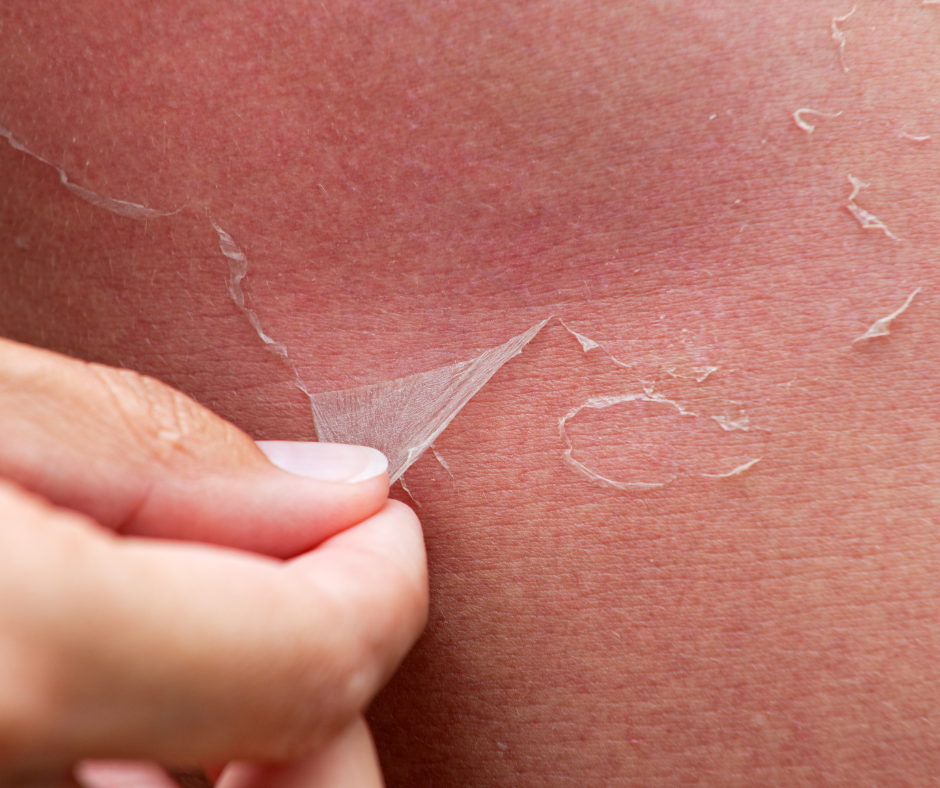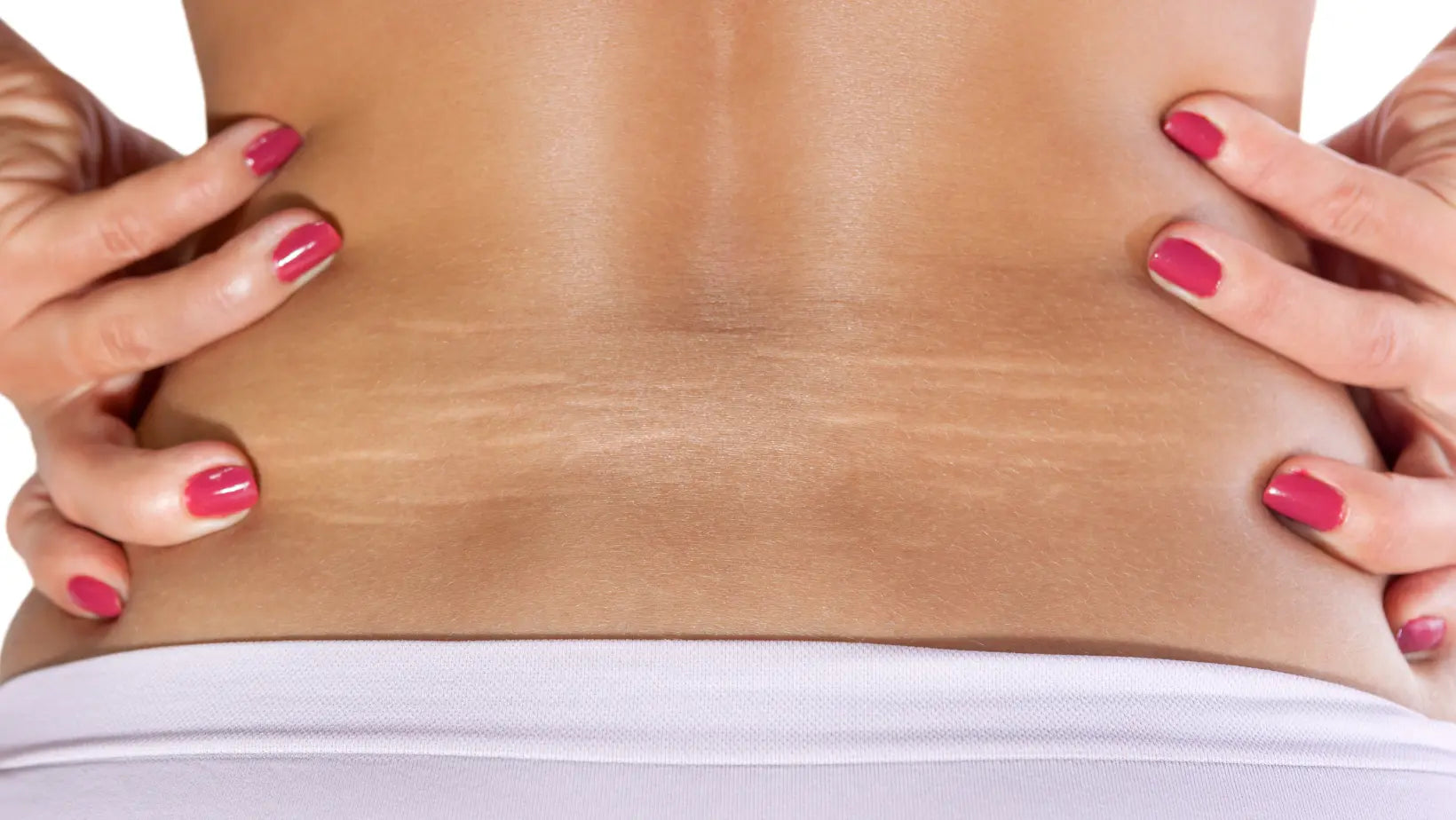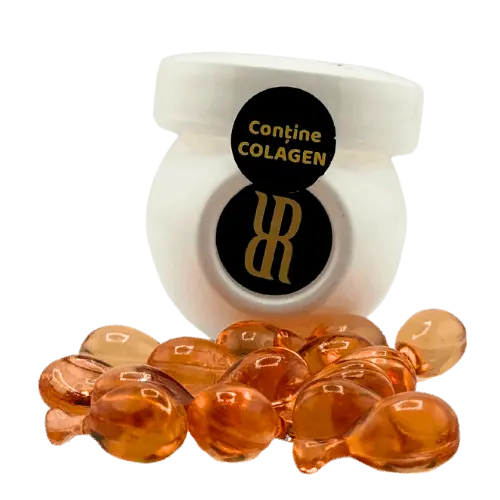What It Is and What Role It Plays in the Body
Collagen
Collagen is one of the most important proteins in the human body, contributing to maintaining the firmness, elasticity, and hydration of the skin. It also plays an essential role in cellular regeneration and tissue repair, being vital for the overall health of the skin, joints, and cartilage.

Causes of Decreased Collagen Production
As we age, the body's natural collagen production begins to decline. This process is influenced by several factors, including exposure to UV radiation, smoking, excessive alcohol consumption, poor nutrient intake, and stress. Additionally, pollution and a sedentary lifestyle can accelerate collagen degradation in the skin, contributing to the appearance of premature aging signs such as wrinkles and loss of skin firmness.

Signs of Low Collagen Levels in the Body
It is important to pay attention to signs indicating a decrease in collagen levels in the body. These include dry and lackluster skin, the appearance of fine and deep wrinkles, fragile nails, and thin, dull hair. You may also experience joint pain and slower wound healing. If you notice these symptoms, it is time to consider collagen supplementation to keep your skin and body healthy.

Benefits of Collagen for Skin
Collagen is essential for maintaining the health and beauty of the skin. It contributes to intense skin hydration, reducing the appearance of wrinkles and fine lines. Collagen improves skin elasticity and firmness by stimulating the production of new collagen. Additionally, regular use of collagen products helps with cellular regeneration, accelerating wound healing and reducing scars and stretch marks.
do you need help?
frequently asked questions
Collagen is a structural protein essential for maintaining the elasticity, firmness, and hydration of the skin. It also plays a crucial role in cellular regeneration and in maintaining the health of joints and connective tissues.
To achieve the best results, it is recommended to use collagen products daily or at least three times a week. Regular application of collagen helps maintain optimal levels of hydration, elasticity, and firmness of the skin.
The collagen capsules from the Royal Rich range are specially formulated to be absorbed quickly and efficiently by the skin. They can be used in your daily skincare routine, after cleansing and before applying other moisturizing or treatment products. Consistency is key to seeing visible improvements in the texture and appearance of your skin.
To learn more, read the article about the recommended frequency of collagen use to achieve the best results.
Each box of Royal Rich collagen capsules contains 15 capsules. If you follow the daily usage recommendations or use them at least three times a week, one box will last you approximately two to five weeks. Daily use ensures optimal benefits and faster results, while using them three times a week may be sufficient for maintaining and supporting skin health in the long term.
Collagen applied externally to the skin works through intensive hydration and stimulation of the skin's natural regeneration processes. When you apply collagen capsules directly to the skin, the collagen penetrates the upper layers of the epidermis, helping to maintain elasticity and firmness. It helps reduce the appearance of wrinkles and improves skin texture, making it smoother and more even. Additionally, locally applied collagen supports the repair of the skin barrier, reducing redness and inflammation, and promotes the production of new collagen cells, thereby improving the overall appearance of the skin.
Topically applied collagen and collagen supplements work in different ways and can have complementary benefits. Topically applied collagen hydrates and repairs the upper layers of the skin, helping to reduce wrinkles and improve skin texture by stimulating local cell regeneration. On the other hand, collagen supplements work from within, being absorbed in the digestive system and then distributed throughout the body, where they can help maintain skin elasticity, strengthen hair and nails, and support joint health. Although both forms of collagen have benefits, their combined use can provide more comprehensive and effective results for skin health and beauty.
In general, externally applied collagen is considered safe for most skin types and rarely causes side effects. However, in rare cases, some people may experience allergic reactions or irritation, especially if they have sensitive skin or are allergic to certain ingredients in the product. It is recommended to perform a sensitivity test before applying collagen to the entire face or body. Apply a small amount of the product to a small area of skin and wait 24 hours to observe any adverse reaction. If no signs of irritation, redness, or itching appear, the product can be used safely. In case of any adverse reactions, discontinue use and consult a dermatologist.
Yes, collagen products are usually suitable for all skin types, including sensitive skin. However, it is essential to perform a sensitivity test before applying the product to the entire face or body. Apply a small amount of the product to a small area of skin and wait 24 hours to observe any adverse reaction. If no signs of irritation, redness, or itching appear, the product can be used safely. Collagen products from the Royal Rich range are formulated with natural ingredients and are designed to be gentle and effective, making them an excellent choice for sensitive skin.
Yes, externally applied collagen can help heal scars and stretch marks. Collagen contributes to skin hydration and regeneration, stimulating the production of new cells and improving skin elasticity. Regular application of collagen-containing products can help reduce the appearance of scars and stretch marks, making the skin look smoother and more even. However, results may vary depending on the severity and age of the scars or stretch marks.
To learn more, read the article about the role of collagen in reducing scars and stretch marks.
Hydrolyzed collagen is collagen that has been broken down into smaller peptides, facilitating its absorption by the skin. Due to the reduced size of the molecules, hydrolyzed collagen penetrates the skin layers more easily, providing quick and effective benefits such as hydration and stimulation of skin regeneration.
On the other hand, other forms of collagen, such as native collagen, have larger molecules that do not penetrate the skin as easily. These forms of collagen act more on the surface of the skin, providing a protective barrier and retaining moisture, but they do not have the same level of penetration and effectiveness as hydrolyzed collagen.
Yes, externally applied collagen is generally considered safe for use during pregnancy. However, it is always recommended to consult your doctor before introducing any new product into your skincare routine during this period. Collagen helps maintain the elasticity and hydration of the skin, which can be beneficial in preventing stretch marks and other skin changes associated with pregnancy.
Yes, externally applied collagen is effective for all skin types. Whether you have dry, oily, combination, or sensitive skin, collagen can help improve skin texture, increase elasticity, and reduce the appearance of wrinkles. However, it is recommended to perform a sensitivity test before use to ensure you do not have any allergic reaction to the product.
To incorporate collagen into your daily skincare routine, follow these steps:
- Cleansing: Start with a gentle cleanser to remove impurities and makeup.
- Toner: Apply a toner to balance the skin's pH and to prepare the skin for collagen absorption.
- Collagen capsule: Apply collagen to clean skin. If you use capsules, open them and apply the product directly to the face, neck, and décolleté.
- Serums: After collagen, apply your favorite serum to address other specific skin needs.
- Moisturizing cream: Seals in all previously applied ingredients with a moisturizing cream suitable for your skin type.
- Sun protection: In your morning routine, don't forget to apply a layer of sun protection to shield your skin from UV rays.
Repeat this process daily to see the best results.
Yes, there are several ingredients that enhance the effects of externally applied collagen:
- Hyaluronic acid: Helps maintain skin hydration, which allows collagen to penetrate better and take effect.
- Vitamin C: Stimulates the natural production of collagen and helps protect the skin against free radicals.
- Retinol: Increases the rate of skin cell regeneration and stimulates collagen production.
- Peptide: Helps repair and build collagen in the skin, improving firmness and elasticity.
- Niacinamide: Reduces inflammation and redness, and may improve the skin's natural barrier, allowing collagen to be more effective.
These ingredients, combined with externally applied collagen, can provide faster and more effective visible results.
Yes, externally applied collagen is beneficial for sun-damaged skin. Sun exposure can damage the natural collagen in the skin, leading to wrinkles, loss of firmness, and elasticity. Applying external collagen can help to:
- Hydration and regeneration: Collagen helps hydrate the skin, reducing dryness and promoting cellular regeneration.
- Soothing inflammation: Collagen can reduce inflammation and redness caused by sun exposure.
- Damage repair: Stimulates the production of new collagen, helping to restore affected tissues and improve the overall appearance of the skin.
Thus, integrating collagen into your skincare routine can significantly help alleviate the negative effects of sun exposure.
To learn more, read the article about the benefits of collagen for sunburns.
Yes, you can use collagen products on acne-prone skin, but it is important to choose non-comedogenic products that will not clog pores. Collagen helps hydrate and repair the skin, which can be beneficial for skin affected by acne. However, it is recommended to do a sensitivity test before introducing a new product into your skincare routine to ensure it will not cause irritation or adverse reactions.
To learn more, read the article about using collagen on acne-prone skin.
Yes, you can use collagen products even if you have oily skin. It is important to choose products specially formulated for your skin type. Opt for products with light, non-comedogenic textures that will not clog your pores. Collagen can help improve skin texture and maintain firmness, regardless of skin type.
Yes, collagen can help reduce dark circles and bags under the eyes. Applying collagen externally helps to hydrate and strengthen the delicate skin around the eyes, improving elasticity and firmness. This can contribute to reducing the appearance of dark circles and bags under the eyes, giving you a more rested and rejuvenated look.
Yes, there are differences between collagen derived from marine sources and that from bovine sources. Marine collagen is extracted from fish and other marine organisms, while bovine collagen comes from cattle. Marine collagen is often considered more effective in stimulating collagen production in the skin due to its higher bioavailability. Additionally, marine collagen is easier for the body to absorb and is preferred by those who avoid terrestrial animal products. On the other hand, bovine collagen is more accessible and is often used in supplements and cosmetic products due to its lower cost. Both types offer similar benefits for the skin, hair, and nails, contributing to maintaining their health and elasticity.
If you are vegan or vegetarian, using traditional collagen can be problematic because it is derived from animal sources, such as the skin, bones, and cartilage of fish or cattle. However, there are plant-based alternatives to collagen, known as plant collagen boosters or products that promote the natural production of collagen in the body.
Yes, there are collagen variants without animal content for vegans and vegetarians. These are known as vegan collagen or plant-based collagen boosters. These products do not contain actual collagen but include ingredients that stimulate the body's natural collagen production. Common ingredients include vitamin C, biotin, zinc, and essential amino acids, which are necessary for collagen synthesis. These alternatives are designed to provide benefits similar to traditional collagen, helping to maintain skin elasticity and health without using animal-derived products.
Yes, you can use external collagen if you have psoriasis. Topically applied collagen can help hydrate and repair the skin, which can be beneficial for people with psoriasis. Collagen can help soothe irritations and improve the elasticity and texture of skin affected by psoriasis. However, it is recommended to perform a sensitivity test on a small area of skin before applying the product to larger areas to ensure no adverse reactions occur. Also, consulting a dermatologist before starting any new treatment is always a good idea to ensure the product is suitable for your specific needs.
The use of external collagen for hair can offer numerous benefits, including:
- Improving the elasticity and strength of the hair strand: Collagen helps strengthen the internal structure of the hair, making it more resistant to breakage and damage.
- Hydration and shine: Collagen-based products can hydrate the hair, giving it a healthier and shinier appearance. Collagen helps retain moisture in the hair strand, preventing it from drying out.
- Reducing split ends: Collagen can help prevent and reduce split ends by strengthening and protecting the hair cuticle.
- Hair growth stimulation: External application of collagen can stimulate hair follicles, promoting faster and healthier hair growth.
- Protection against environmental factors: Collagen forms a protective barrier around the hair strand, shielding it from pollution, UV rays, and other harmful environmental factors.
- Improving hair texture: Hair can become softer and easier to manage due to the moisturizing and strengthening effects of collagen.
- Reducing hair loss: By strengthening the roots and the structure of the hair strand, collagen can help reduce hair loss.
It is important to mention that the benefits may vary depending on the type and quality of the product used, as well as the regularity and correctness of its application.
1. Night or hair mask with collagen
- Preparation: Open the collagen capsules and mix the contents with a little water or with a hair oil base (such as coconut oil or argan oil).
- Application: Apply the mixture to clean, damp hair, focusing on the lengths and ends. Avoid applying directly to the roots to prevent hair from becoming greasy.
- Action time: Leave to act for 20-30 minutes, then rinse well with lukewarm water.
- Frequency: Once a week is usually enough to see benefits, but you can adjust the frequency according to your hair's needs.
2. Add to shampoo or conditioner
- Preparation: Open the collagen capsules and mix the contents with a small amount of shampoo or conditioner in your palm, just before use.
- Application: Wash your hair as usual, making sure the collagen mixture is evenly distributed.
- Rinse: Rinse your hair thoroughly after applying shampoo or conditioner.
- Frequency: You can use this mixture 2-3 times a week.
3. Intensive overnight treatment
- Preparation: Mix the contents of the collagen capsules with a hair oil or a leave-in conditioner.
- Application: Apply the mixture to the hair, cover it with a towel or a shower cap, and leave it on overnight.
- Rinse: In the morning, wash your hair well with shampoo and conditioner.
- Frequency: Once a week or every two weeks for a deep treatment.
These methods will help integrate collagen into your hair care routine, providing it with hydration, shine, and additional strength.
The use of external collagen for nails can bring numerous benefits, contributing to their health and appearance. Here are some of the main advantages:
1. Strengthening nails
Collagen helps strengthen the nail structure, preventing breaking and peeling. Regular application can make nails stronger and more durable.
2. Hydration of the cuticles
Collagen-based products can hydrate the cuticles and the skin around the nails, preventing them from drying out and cracking. Hydrated cuticles better protect the nail root, contributing to its healthy growth.
3. Promoting healthy nail growth
Collagen provides the amino acids necessary for the production of keratin, the main protein in the structure of nails. This can accelerate nail growth and improve their overall quality.
4. Improving the appearance of nails
Nails treated with collagen can become smoother and shinier. Applying collagen can reduce uneven appearance and improve the natural color of the nails.
5. Reducing the risk of infections
Healthy skin and cuticles are a natural barrier against infections. Collagen helps maintain the integrity of the cuticles, reducing the risk of fungal and bacterial infections.
6. Regenerating damaged nails
For already damaged or brittle nails, collagen can accelerate the regeneration process and improve their texture and strength.
Blog articles

How does genetics influence the predisposition to stretch marks?
When the skin stretches quickly or excessively, a visible phenomenon known as stretch marks can appear. These fine lines, often a different color than the surrounding skin, form due to the breaking...
Read more
Top 5 myths about stretch marks you need to know
When the skin undergoes a sudden stretch, fine and visible lines can form, known as stretch marks. These can change color over time, from pink or purple to white, as the skin adapts. Their appearan...
Read more
Stretch marks and menopause: Hormonal changes and their impact on the skin
Menopause is a natural and inevitable stage in your life, marking the end of the menstrual cycle and bringing with it a series of significant hormonal changes. During this period, the levels of est...
Read more


